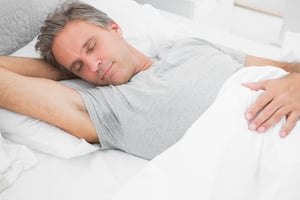Time to read: 3 minutes
A good night’s sleep is so important for our health and wellbeing, but if you have hearing loss, getting good quality sleep in the right amount might be difficult.
So, why is that?
According to researchers there are several factors that might impact your sleep and your hearing:
 Tinnitus: Tinnitus can create a vicious cycle. The sound prevents you from sleeping and that lack of sleep can make tinnitus worse. But there is good news - hearing aids, along with cognitive training can make the condition more manageable. We have an article here on how hearing aids can help manage tinnitus.
Tinnitus: Tinnitus can create a vicious cycle. The sound prevents you from sleeping and that lack of sleep can make tinnitus worse. But there is good news - hearing aids, along with cognitive training can make the condition more manageable. We have an article here on how hearing aids can help manage tinnitus.
Mental Stimulation: Hearing aids help your brain to hear sounds it can process. That stimulation is great during the day when you want to be aware of your surroundings. It’s not so good when you want to sleep. If you find yourself taking off your hearing aids before bed and your brain continues to search for sound, try meditation techniques to focus your mind towards sleep. We share some good sleep tips below.
Social Isolation: Social isolation and depression can rob you of a good night’s sleep by affecting its quality and duration. People who have unaddressed hearing loss have higher incidence of social isolation and depression compared to those wear hearing aids. Hearing aid wearers report better quality of life compared to those who have untreated hearing loss. We cover this in an article on hearing loss and dementia.
 Poor Cardiovascular Health: This affects so many aspects of your life. Insomnia is linked to poor cardiovascular health, which of course impacts on your health and fitness. It is also associated with sleep apnoea. This can cause changes in blood vessel function that reduces blood supply to the heart in people who are otherwise healthy. Poor blood circulation impacts the tiny little hair cells in your ears which transmits sound to the brain. For more information on how exercise may positively impact on your hearing and health, we have an article here.
Poor Cardiovascular Health: This affects so many aspects of your life. Insomnia is linked to poor cardiovascular health, which of course impacts on your health and fitness. It is also associated with sleep apnoea. This can cause changes in blood vessel function that reduces blood supply to the heart in people who are otherwise healthy. Poor blood circulation impacts the tiny little hair cells in your ears which transmits sound to the brain. For more information on how exercise may positively impact on your hearing and health, we have an article here.
If you are at all concerned about any health issues you might have. Please do see your doctor.
Wearing hearing aids help you during the day when you really need to stay alert to conversations and other sounds.
Your brain is actively processing and analysing sounds it hears, so it makes sense that at the end of the day, you and your brain are feeling just a little bit tired. That means you are more likely to enjoy a deeper and more restful night’s sleep.
According to the Australian Sleep Health Foundation there are a number of things you can do to get a good night's sleep.
Among their tips are:
- Avoid daytime naps or limit them to only 20 minutes
- Find a relaxation technique that works for you, that might mean listening to relaxing music, reading or meditating
- Make your bedroom conducive to sleeping - a comfortable bed in a dark, quiet place.